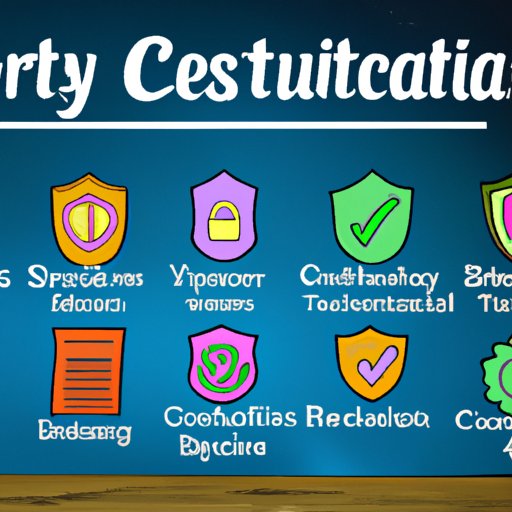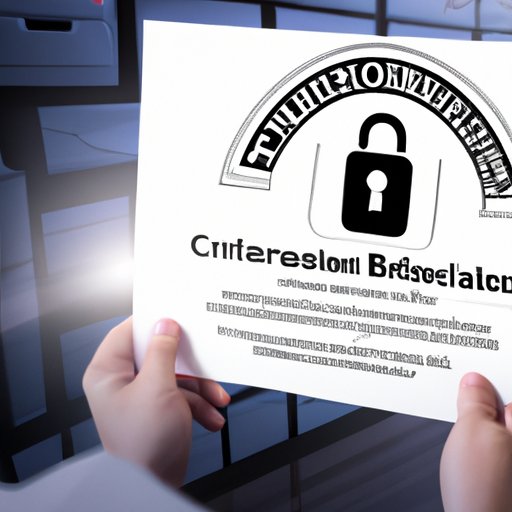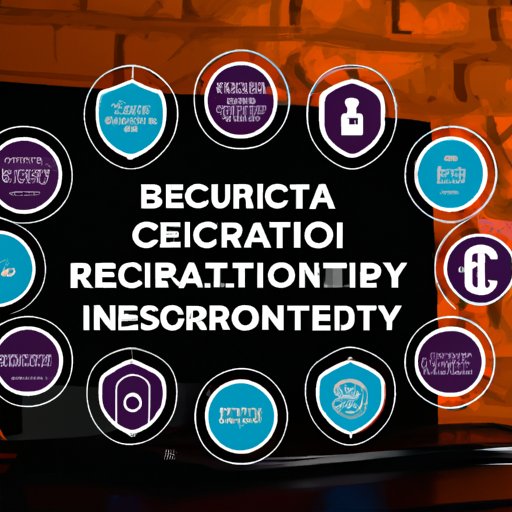Introduction
With the increasing prevalence of cyber threats, cyber security professionals are in high demand. As a result, employers are now looking for employees who possess the necessary skills and qualifications to protect their systems from malicious attacks. One way to demonstrate your expertise in this field is by obtaining relevant cyber security certifications. By having these certifications on your resume, you can prove to potential employers that you have the knowledge and skills needed to protect their networks.
A Comprehensive Guide to the Must-Have Cybersecurity Certifications
In this article, we’ll provide a comprehensive guide to the top 5 must-have cyber security certifications. We’ll also discuss the benefits of holding a certification, what you need to know about the different certifications, and the value of having them on your resume.

The Top 5 Cybersecurity Certifications You Should Obtain
When it comes to cyber security certifications, there are many to choose from. However, some certifications are more widely accepted than others. According to a survey conducted by the Computing Technology Industry Association (CompTIA), the following five certifications are the most sought-after by employers:
- Certified Information Systems Security Professional (CISSP)
- Certified Ethical Hacker (CEH)
- Certified Information Systems Auditor (CISA)
- CompTIA Security+
- GIAC Security Essentials (GSEC)

An Overview of the Best Cybersecurity Certifications for Your Career
Each of these certifications offers its own unique set of benefits. CISSP is considered the gold standard of cyber security certifications and is one of the most highly recognized credentials in the industry. It demonstrates your understanding of security concepts and practices. The CEH certification is designed to give you a deep understanding of ethical hacking techniques and how to use them to identify potential security vulnerabilities. CISA is specifically designed for those who work in auditing and information systems control. CompTIA Security+ is an entry-level certification that covers a wide range of topics, including network security, compliance, and operational security. Finally, GSEC is a hands-on exam that tests your ability to apply security principles and technologies.

Exploring the Benefits of Holding a Cybersecurity Certification
Having a certification can open up new opportunities for career advancement. According to a recent study by Burning Glass Technologies, job postings that require a security certification pay an average of 17% more than those that don’t. Additionally, many employers view certifications as proof of an individual’s commitment to their profession. This can be especially beneficial for those just starting out in the field, as employers may be more likely to hire someone who has taken the time to invest in their education and training.

What You Need to Know About the Different Cybersecurity Certifications
When considering which certification to pursue, there are several factors to consider. First, there are different types of certifications available, such as vendor-specific or vendor-neutral certifications. Vendor-specific certifications are offered by companies like Microsoft and Cisco and are specific to their products. Vendor-neutral certifications are generally more broadly applicable and can be applied to multiple products and services. Second, each certification has its own set of prerequisites that must be met in order to be eligible to take the exam. These prerequisites vary depending on the certification, but typically include a certain amount of experience in the field and/or completion of a related course. Finally, the cost of obtaining a certification can vary significantly. Some certifications are free, while others can cost hundreds or even thousands of dollars.
The Value of Having Cybersecurity Certifications in Your Resume
Having a certification on your resume can make you stand out from other applicants and demonstrate your dedication to the field. According to research conducted by the International Information System Security Certification Consortium (ISC)², “83% of organizations report that the presence of certified personnel has a positive impact on their organization’s security posture.” Additionally, the same study found that “90% of organizations believe that certified personnel are more likely to identify and mitigate potential security risks.” In other words, having a certification can make you a more attractive job candidate and improve your chances of landing the job.
Examples of Cybersecurity Certifications That Increase Your Job Prospects
The most popular certifications for cyber security professionals today include: Certified Information Systems Security Professional (CISSP), Certified Ethical Hacker (CEH), Certified Information Systems Auditor (CISA), CompTIA Security+, and GIAC Security Essentials (GSEC). Each of these certifications provides a different level of expertise and knowledge in the field, so it’s important to select the one that best meets your needs. For example, if you’re looking to become a network administrator, then the CompTIA Security+ certification would be most beneficial. On the other hand, if you’re looking to become a security analyst, then the CISSP certification would be more appropriate.
Conclusion
Cybersecurity certifications offer numerous benefits to those seeking to advance their career in the field. Not only do they demonstrate your commitment to the profession, but they can also increase your job prospects and salary potential. There are many different certifications to choose from, so it’s important to research and select the one that best fits your goals and needs. With the right certification under your belt, you can ensure that you stay ahead of the competition and remain a valuable asset to any organization.
Summary of the Benefits of Obtaining Cybersecurity Certifications
Obtaining a cyber security certification can provide numerous benefits, including increased job prospects, higher salaries, and greater recognition within the industry. It can also demonstrate your commitment to the profession and serve as proof of your expertise in the field. Additionally, having a certification on your resume can make you more attractive to employers and give you an edge over other applicants.
Final Note on the Importance of Cybersecurity Certifications
As cyber threats continue to evolve, it’s more important than ever to stay up-to-date with the latest security trends and best practices. Having a certification provides a way to demonstrate your knowledge and expertise in the field and can help you stand out from other applicants. So, if you’re looking to advance your career and stay ahead of the competition, obtaining a cyber security certification is a must.
(Note: Is this article not meeting your expectations? Do you have knowledge or insights to share? Unlock new opportunities and expand your reach by joining our authors team. Click Registration to join us and share your expertise with our readers.)
